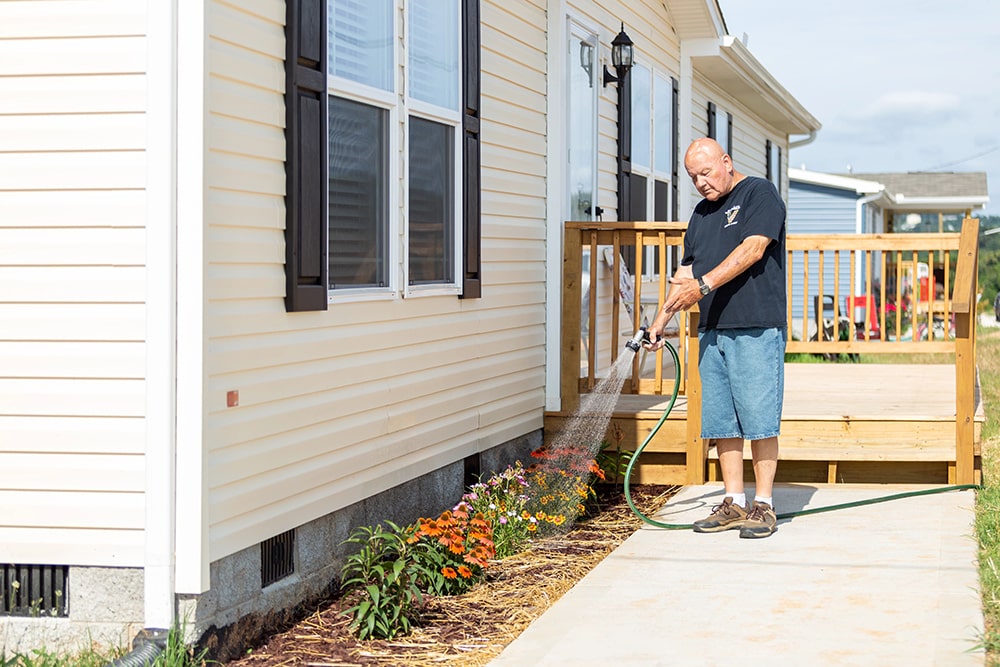
3 Tips on Budgeting for a NEW Mobile Home!
Personally, I don’t shop much for myself. When and if I do spend money, it’s primarily for my niece, my nephews, or my dog.
Not that I don’t find instant gratification enticing, I would just prefer to spend money only when necessary, and with the holidays just around the corner – you can bet my Amazon cart is full!
Some folks live for the fresh popcorn and coffee scent of a Target, while I inwardly cringe knowing my wallet is soon to be significantly lighter.
What can I say? I live alone, and depend on Me, Myself, and I. Not much room for financial error to be made, you know?
So, a couple years back when I decided to buy a house, the idea of committing to such a big purchase was difficult, but looking at it as an investment made the idea less intimidating.
However, I knew in order to afford a home, I needed to take a deep dive into my current finances and spending habits to get a better idea of how I could save up and eventually pay for a home. Using some of the tactics I have in place for even small purchases made it much more bearable.

1. Setting a budget that makes sense.
Unlike a typical Sunday trip to the local grocery store, buying a home has many different expenses that are pretty much unavoidable. When budgeting for a new mobile home, consider these three different costs:
- Loan – the total amount that will be borrowed from the bank
- Insurance – like a leased car, homes with a mortgage must have home insurance
- Taxes – this includes sales tax as well as property taxes that can be rolled into your monthly payment or paid annually with the county
Each of these factors can have other variables to review as well.
For instance, if your dream is to own at least 20 acres of land in the picturesque hill country of south Texas (or any state for that matter), but your budget reminds you that the taxes on a property that size would be almost the same as a loan payment.
The key to a good budget: is taking the time to come up with an actual, realistic number that your family can comfortably manage from month to month.
Be sure to look at all of your current expenses – from rent and utilities all the way down to Friday night pizza.
Every penny spent counts.
Budgeting requires honesty about how much money you make and how you spend it. It is better to budget based on the months you tend to have less cash flow, not the ones with bonuses and birthday money from relatives.

2. Keep your eyes on the prize.
Now that you’ve taken a hard, critical look at your finances and have come up with a realistic number for your home loan, you can begin to shop!
This is crucial because knowing how much you can spend means you can narrow your search down to only what you can afford. So much time and heartache will be spared if you only walk through homes that fit in your budget.
I remember going to open houses before knowing exactly how much I could afford, and that was one of my biggest regrets during my house hunting experience.
I fell in love with several homes that were just out of reach, and unfortunately some realtors or sales representatives will show you homes above your budget to push for a higher commission.
You just need to stand firm, and view homes that do not exceed your financial requirements. Because you’re so determined to stay on track and to not be persuaded to put yourself in financial strain, get a housing consultant that is on your side!
Once you’ve given your housing consultant your budget and reminded them how serious you are, you should not have to worry about being tricked or duped into what you can’t afford.
But, just in case, be sure to watch out for phrases like “it’s just a little over your budget” and “upgrade packages.” Demand transparency about any estimated costs, thoroughly review every purchase agreement, and only sign what you understand.

3. Check your list twice!
Your budget is the ultimate decision maker in the home-buying process – not what other people can afford.
Don’t get caught up in the comparison game.
The only winner in that game is the bank. You’ve made your budget based on what is best for your own family, not someone else’s.
Something helpful that we often recommend to our customers is to write a list of reasons why staying on budget is vital for your family.
- Maybe you need flexibility to take time off of work
- Perhaps you want to travel more
- Or possibly stay home to homeschool your children
Go back to this list as a reminder why the stainless steel appliance package or handmade glass backsplash will not make the difference in the long term.
Making the budget is not the hard part. Sticking to it, when it seems everyone else is saying you shouldn’t, is what’s difficult. But it’s not impossible! I can’t tell you how many times something I thought was a sacrifice in buying my home actually became a joy. And, as it turns out, the things I thought I needed couldn’t compare to what I already had!

So that’s it: 3 Tips on Budgeting for a NEW Mobile Home! This article has been updated to reflect change over time. Follow the links in this page! We would love to answer any of your questions on our Facebook Page or through our Contact Form.
Have a question?
Drop us a message and we'll get back to you with some answers!